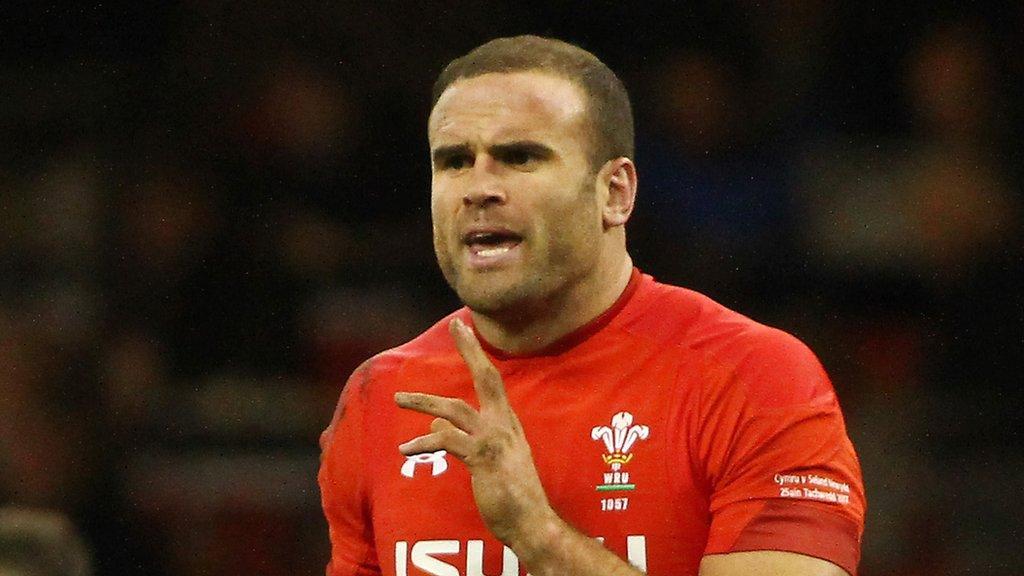Warren Gatland: 10 years in Welsh rugby's goldfish bowl
- Published
- comments
Gatland reflects on his 10 years as Wales head coach with former Test flanker Martyn Williams
'Tough' seems as good a word as any to summarise Warren Gatland's 10 years as head coach of Wales.
'Resilient' would be another, and 'pragmatic' probably fits the bill too.
The 54-year-old, Wales' longest-serving head coach, has presided over a period of unprecedented success since the game turned professional.
In his first six years in the job, the team won two Grand Slams, a Six Nations championship and reached the semi-finals of the 2011 World Cup - arguably a golden era.
Yet the New Zealander has never become the darling of the public in the way Graham Henry did in his early days in Wales, or as Mike Ruddock did in his relatively brief tenure in the mid-noughties.
Some sections of the media are openly hostile to his perceived direct playing style, and the unchanging nature of his coaching team.
The public, at least those who live part of their lives on social media, like to see Wales win but demand a dash of flash to go with the crash.
In the face of what he and his players like to call the goldfish bowl of Welsh rugby - which in reality is south Wales - Gatland has remained consistent, unwavering, immovable.
Time to reflect, then, on a decade of Gatland in Wales.

Warren Gatland's record as head coach of Wales. Correct at 2 February, 2018
His first captain's view
Ryan Jones remembers clearly the moment he first spoke to Gatland.
"The thing that stands out most is having a phone call from Warren asking me to be captain," said Jones.
"I remember driving on the M4 between Pyle and Port Talbot - on that bend - and it was Warren Gatland on the phone asking me if I'd be prepared to, if I wanted to...
"I'd never spoken to Warren before and it was a pretty short answer."
Jones had played under Ruddock, Gareth Jenkins and Nigel Davies, but immediately noticed a difference with Gatland.
"Warren's environment was very different. He challenged us physically, he challenged us mentally. He came in and basically tore up the play book if you like," Jones remembered.
"It was a game that was going to be built on discipline, set-piece - a solid foundation. How quickly we could add on the rest was going to be a challenge but the boys sort of rose to that."
Jones' first game as captain - and Gatland's first as coach - saw Wales beat England at Twickenham for the first time in 20 years.
It was a team consisting of 13 Ospreys plus Scarlets wing Mark Jones and Cardiff Blues' Martyn Williams, who Gatland had talked out of international retirement for the tournament.
Wales went on to win the 2008 Six Nations Grand Slam, a year after losing four out of five games in the tournament, and six months after being dumped out of the 2007 World Cup by Fiji.
Jones was a key member of the 2005 Grand Slam team, but said this time it wasn't the same.
"It was a very different feel," he said. "It wasn't, as you say, fly by the seat of your pants - but that's doing '05 a disservice. But it was a very different approach.
"A very methodical, battle-hardened approach and you marry the two and you have a group of players who actually felt invincible."
Pragmatic approach
Gatland's first selection for Wales hinted at the pragmatism that would mark one of the many contrasts with the regimes that preceded his appointment.
He wanted to introduce Shaun Edwards' blitz defence. Ospreys were the only Welsh region who employed the system, so he named 13 of them to play England.
It worked. Wales hit back from 16-6 at half-time to win 26-19 and Toby Flood's 23rd-minute try was one of only two Wales conceded in the tournament.
Six Nations 2018: Gatland's reign a 'good 10 years' says Jonathan Davies
That hard-headed attitude was obvious again as he named the team to play Scotland in the first game of the 2018 Six Nations.
Without seven British and Irish Lions because of injury, he announced 10 Scarlets in his starting XV. They are the reigning league champions and the in-form region in Wales, so why not?
The omission of one Scarlet - flanker James Davies - was another example of Gatland resisting a public clamour for the inclusion of a popular and effective player.
He's never been afraid of the tough decisions - whether it's dropping Brian O'Driscoll for the third Test of the 2013 Lions series, or ending Adam Jones' Wales career within sight of 100 caps.
But then sentiment didn't figure highly in Gatland's treatment by New Zealand when he was a player.
According to then captain Sean Fitzpatrick, Gatland was a world-class hooker. But Fitzpatrick was skipper of a formidable side and was an immovable object in the middle of the All Blacks front row.
So Gatland sat on the bench 20 times in Test matches and never won a cap. Fitzpatrick would not come off for an injury or even for the final minutes of an already won match.
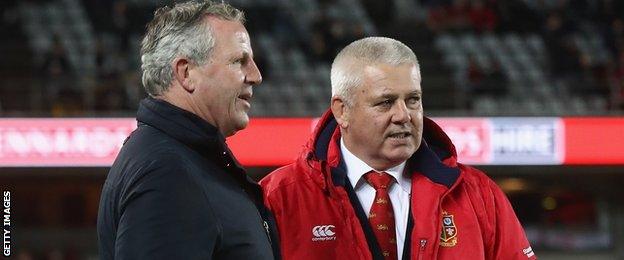
Sean Fitzpatrick's presence meant Warren Gatland never played a Test match
He told BBC Wales in 2017 he feared if he did Gatland might sow seeds of doubt in the selectors' minds. "It was a compliment," he said.
Sentiment? New Zealand rugby doesn't do sentiment - at least not on the pitch.
Jamie Roberts has seen first-hand the toughness of Gatland's vision, but was its beneficiary first.
For many years his go-to centre, Roberts is the player whose return to fitness led to the O'Driscoll affair in Australia, and whose inclusion led the the accusations of "Warrenball" - a term Gatland himself says he does not understand.
Three games short of a century of Test matches for Wales and the Lions, Roberts appears not to fit in with the more open style of play Wales are trying to establish before the 2019 World Cup.
Even with the injury crisis facing Wales, he has remained outside the Six Nations squad.
He has nothing but praise for Gatland, but expects no special treatment.
"I know Warren and he doesn't pick on sentiment and he will pick the team that is the best to win a game for Wales," Roberts said.
"I am forever grateful to Gats for giving me an opportunity to play for Wales.
"He identified me as a young player and facilitated my move into the midfield on the summer tour in South Africa in 2008.
"It has given me an unbelievable career in Test and club rugby which I couldn't have dreamed of and I am grateful for that.
"The success he has bought Wales in the Six Nations is impressive and he has helped create memories players and fans will recall for the rest of their lives."
Southern hemisphere question
The notable blot on Wales' record under Gatland is their difficulty in beating South Africa, Australia and New Zealand.
It is not for the want of trying. Wales have played the 'big three' more times than any other northern hemisphere side in the same period, but have won only four times in 38 attempts.
Three of those have come against South Africa, with a solitary win over the Wallabies back in 2008.
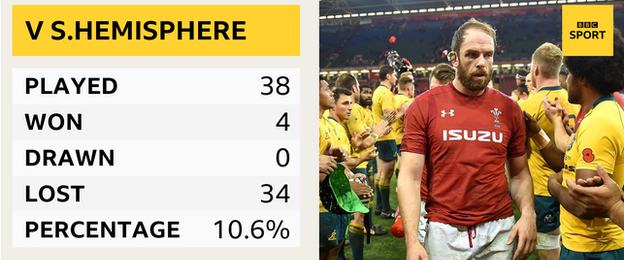
Wales' record versus New Zealand, Australia and South Africa since 2008
Scotland beat Australia twice in 2017, while England and Ireland have both beaten the All Blacks during Gatland's reign in Wales.
Wales' record against the Springboks is better than England's in the past 10 years, but England have beaten Australia nine times since 2008.
Question of perception
One of Gatland's biggest issues might be that he is not a photo-fit "Welsh" Wales coach.
He may be in charge of the team from the land of their fathers but Gatland was forged in the land of the mighty Waikato - and the attitude to the game in New Zealand and Wales is different.
Gatland is pragmatic, undemonstrative at pitchside and, perhaps because his heart isn't obviously on his sleeve, un-Welsh.
His stoic, matter-of-fact manner is in contrast to the amiable Mike Ruddock or lyrically Welsh Clive Rowlands or scholarly Carwyn James.
The latter may not have coached Wales, but he led the Lions to victory in New Zealand and is regarded as nothing less than a rugby god.
The Welshman Gatland may be most like is John Dawes - the practical, tactically astute and well-organised coach whose team of all the talents won two Grand Slams and four Triple Crowns between 1976 and 1979.
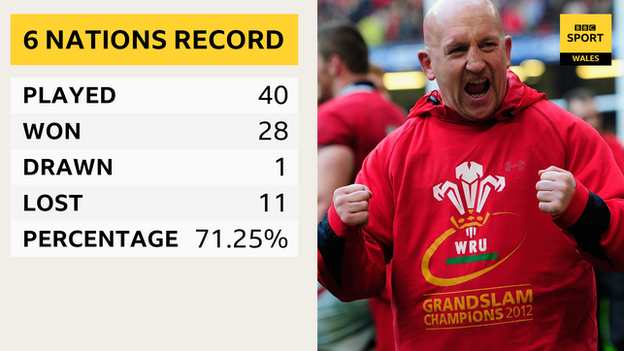
Excluding 2013 and 2017 (when Rob Howley was coach)
It's not a bad point of comparison, and Gatland's turns as Lions coach have been more successful, though Dawes was captain of the '71 tourists and the Wales Grand Slam team of the same year.
Gatland himself identifies what he considers to be a tendency among fans to be over-critical of Wales, which counterbalances the obvious pride Welsh people have in their country and its achievements - whether on the sports field or elsewhere.
He has also said that his two "sabbaticals" as coach of the 2013 and 2017 Lions were a release valve, though it's not obvious how the ordeal of the the New Zealand media coverage last year could have been a relief. No media outlet in Wales has ever depicted Gatland in a clown suit.
There are now less than two years left before the New Zealander stands down after the 2019 World Cup.
Gatland is clearly not a lost soul swimming in Welsh rugby's fishbowl, to misquote Pink Floyd.
The target now is success in Japan and after that it will be someone else's responsibility.
Following him is likely to be tough.
Gatland himself believes the tribal nature of the game in Wales would make the job more difficult for a Welshman.
He also cautions that if Wales again look overseas, then that coach would need a Welsh backroom team around him to be "his eyes and ears".
Sage advice for the start of a new era.
- Published2 February 2018
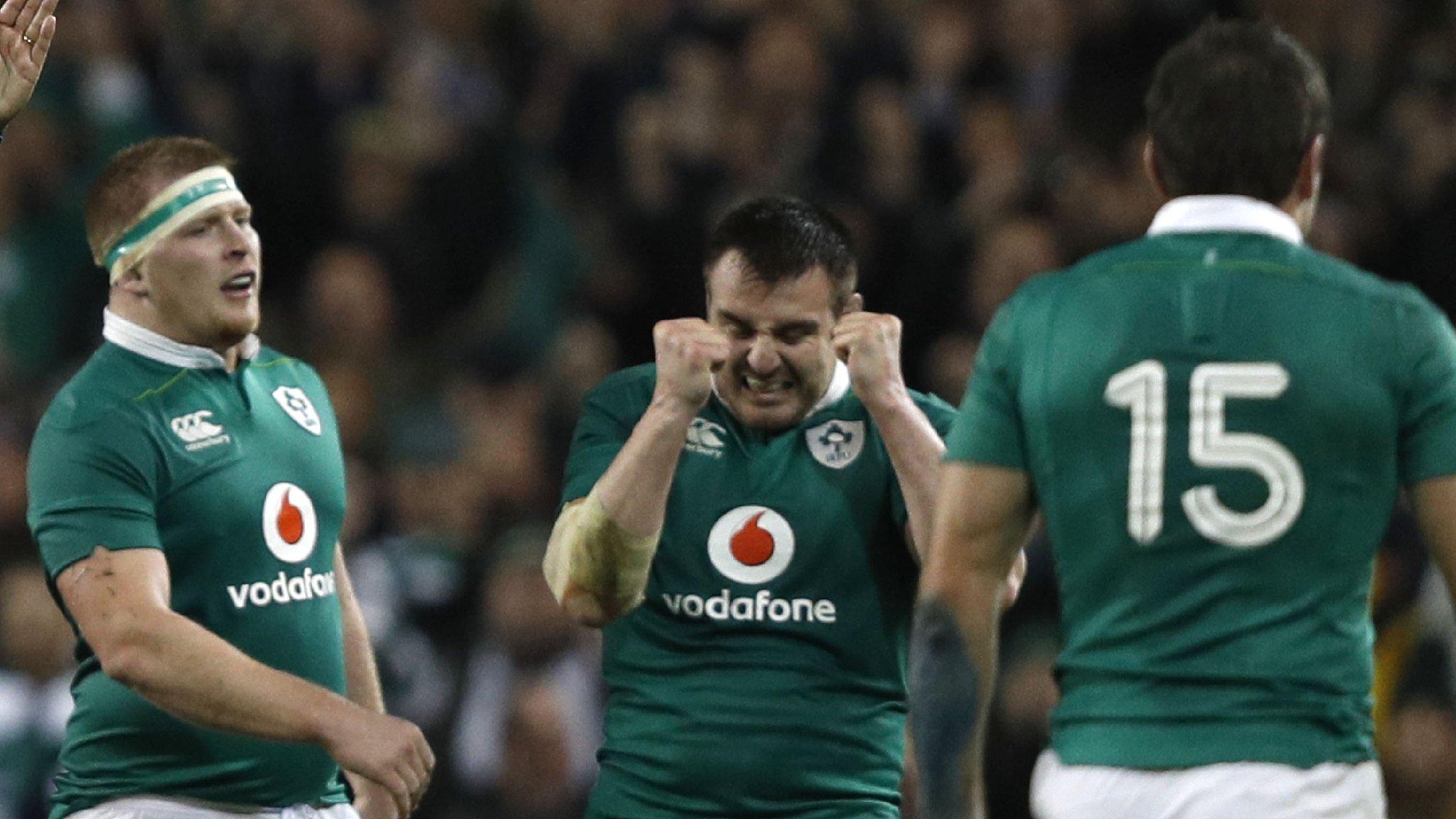
- Published1 February 2018
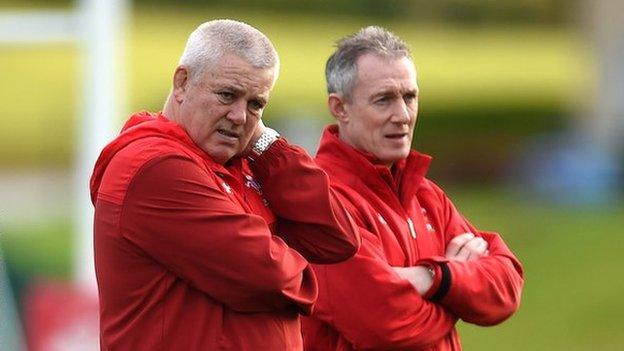
- Published2 February 2018
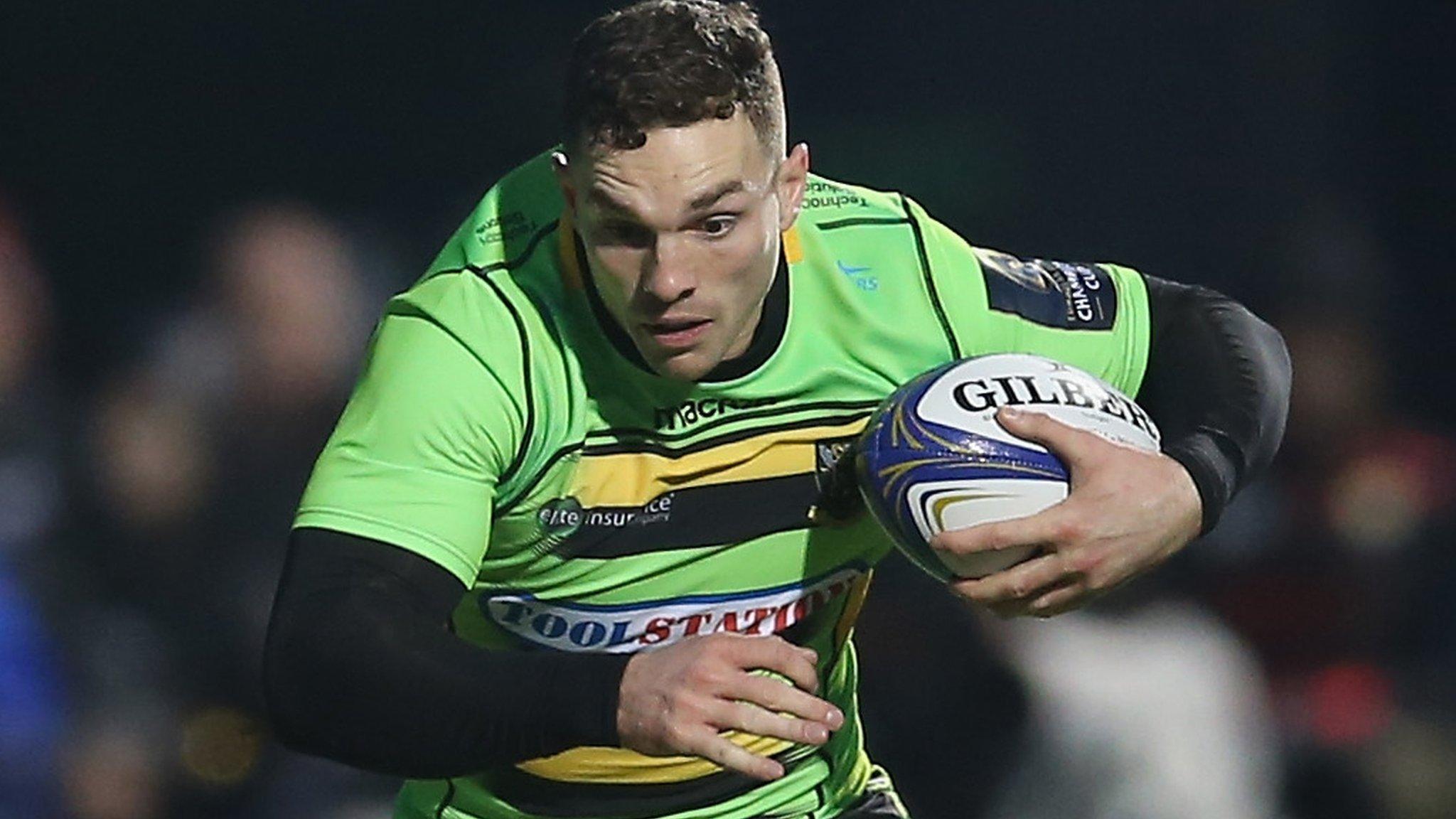
- Published1 February 2018
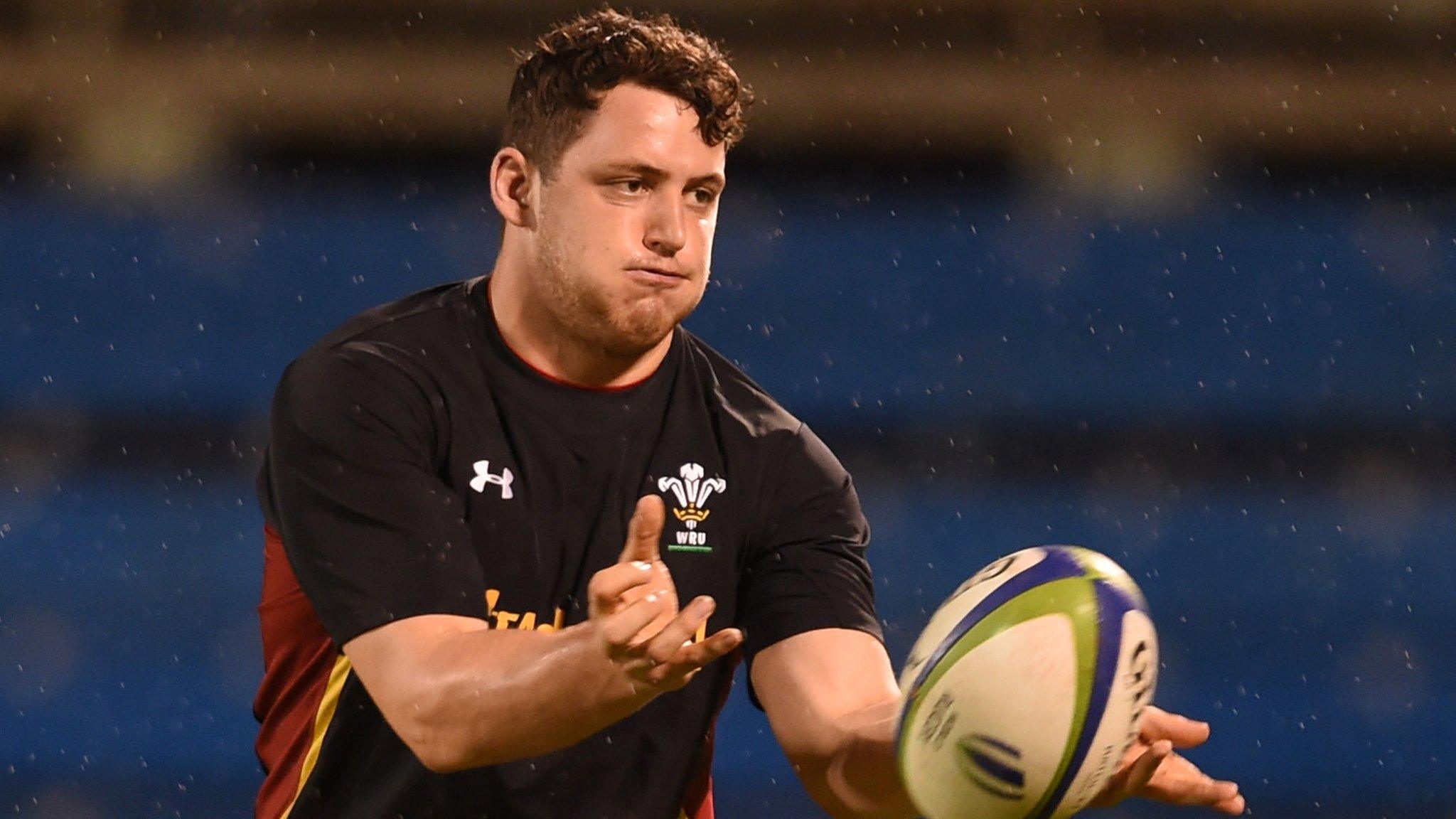
- Published1 February 2018
